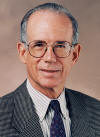 Science's
Editor in Chief Says Creationism Deadens Curiosity. (April 28, 2007)
Science's
Editor in Chief Says Creationism Deadens Curiosity. (April 28, 2007)|
|
|
|
|
|
|
News & Views item - April 2007 |
![]()
 Science's
Editor in Chief Says Creationism Deadens Curiosity. (April 28, 2007)
Science's
Editor in Chief Says Creationism Deadens Curiosity. (April 28, 2007)
Donald Kennedy, Editor in Chief of the journal Science and President Emeritus of Stanford University told a full house at the university's Cubberley Auditorium on April 4 that high school students who are taught creationism instead of evolutionary theory lack the critical thinking skills that are necessary for university.
Not one to mince words he told his audience that creationism discourages students from applying the scientific method, "What the creationist alternative does to students is to intercept and deaden curiosity. If relationships or correlations can be simply allocated to the cleverness of a designer, there's very little incentive to think up an experiment or undertake an analysis."
Chelsea Anne Young reporting for the Stanford News writes:
Kennedy is currently serving as an expert witness for the University of California Regents, who are being sued by a group of Christian schools, students and parents for refusing to allow high school courses taught with creationist textbooks to fulfill the laboratory science requirement for UC admission. After reading several creationist biology texts, Kennedy said he found "few instances in which students are being introduced to science as a process—that is, the way in which scientists work or carry out experiments, or the way in which they analyze and interpret the results of their investigations... [rather they] use 'ridicule and inappropriately drawn metaphors' concerning evolution to discourage students from formulating independent opinions. 'Even with respect to the hypothesis that dominates them—namely, that biological complexity and organic diversity are the result of special creation—critical thinking is absent'".
Dr Kennedy went on to say that the utility of teaching science is "to produce a thin layer of outstandingly brilliant innovators [and] to produce a level of scientific literacy in the general population that can help our society apply better judgments to policy issues in which science and technology play crucial roles." He added that current secondary school programs were not meeting the challenge: "In the education space, there is a strange barrier to the infectivity of good ideas and models."
At the root of the problem, Dr Kennedy said is a failure to attract and retain qualified teachers: "There is a rather sad, old joke, 'What is the first name of the average high school physics teacher in Texas?' The answer is 'Coach.'"
Ms Young reports that Dr Kennedy closed his lecture by encouraging "Stanford to take the lead in education reform by increasing dialogue and collaboration between the university faculty and researchers and primary and high school teachers. In closing, he challenged the audience and Stanford to take an active role in solving the problem, asking, 'If not here, where?'"